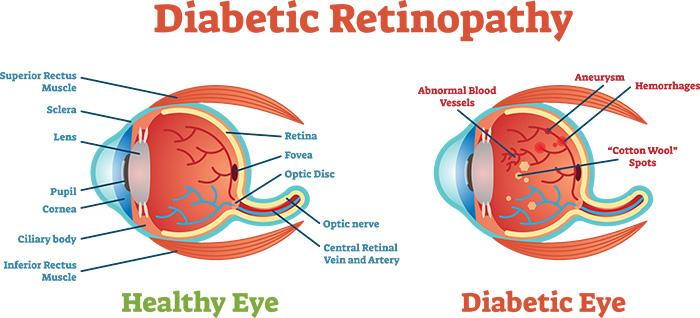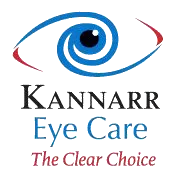
November is Diabetes Awareness Month, and that means it’s time to talk about how diabetes impacts eye health.
With diabetes comes the increased risk of developing a few different eye diseases, which are often referred to under the umbrella term of diabetic eye disease. These conditions include diabetic retinopathy, diabetic macular edema (DME), cataract, and glaucoma. They combine to make diabetes a leading cause of irreversible blindness worldwide, as well as the most common cause of blindness in Americans under retirement age.
How Diabetes Affects The Eye
Having type II diabetes or gestational diabetes means your body can’t use insulin effectively to regulate blood sugar. When blood sugar remains high too much of the time, it leads to all kinds of problems. The sugar is hard on blood vessels, and it raises the risk of infection because it’s the favorite food of harmful bacteria.
Diabetic Retinopathy And DME
Retinopathy is a condition in which the blood vessels at the back of the eye become damaged and leak blood into the fluid of the eye, creating dark blotches across the field of vision. When this happens, our eyes attempt to compensate for the damage and reduced blood flow to the retina by growing new blood vessels. However, these tend to be fragile and even more prone to breakage.
Diabetes is the leading cause of retinopathy, and when it advances far enough, it leads to diabetic macular edema (blurred central vision), retinal detachment, and even blindness.

“Diabetic Retinopathy.” American Optometric Association, www.aoa.org/patients-and-public/eye-and-vision-problems/glossary-of-eye-and-vision-conditions/diabetic-retinopathy.
Cataract
The lenses of our eyes are filled with transparent proteins; however, these proteins become clumped together, turning opaque and blocking our vision. This is what we call a cataract. While cataracts are already a common side-effect of age, adults with diabetes are five times more likely to develop them. The good news is that cataract removal surgery is a very safe, common procedure.
Glaucoma
In order to work properly, our eyes continually replace the fluids inside them. Glaucoma is a condition in which the flow of liquid out of the eye becomes blocked in some way, increasing the pressure on the optic nerve, which causes damage — and, if it isn’t caught in time, permanent blindness. Diabetes is a major cause of glaucoma. If you experience symptoms like eye pain, eye redness, a halo effect around lights, tunnel vision, or sudden vision loss, come see us immediately.
Regular Check-ups Can Save Your Sight
The two most important people when it comes to saving your sight from diabetic eye disease are you and your eye doctor. Keeping your blood sugar as close to normal as possible will help reduce your risk levels to those of people without diabetes, and early detection of diabetic eye disease reduces the risk of blindness by a whopping 95 percent! This is why regular eye exams are especially crucial for diabetic patients.
Together, we can keep your vision healthy for life!
The content on this blog is not intended to be a substitute for professional medical advice, diagnosis, or treatment. Always seek the advice of qualified health providers with questions you may have regarding medical conditions.
Top image used under CC0 Public Domain license. Image cropped and modified from original.
